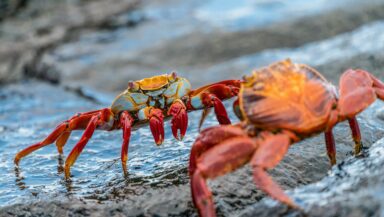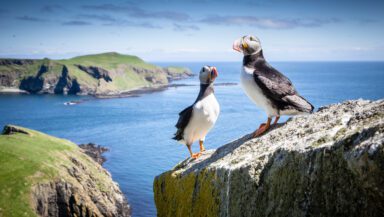In response to this the fishing community, chefs and food writers have penned an open letter – coordinated by Greenpeace UK – calling on the public to buy more locally caught seafood to help support them through the crisis.
The letter is signed by representatives of the fishing community and chefs including Yotam Ottolenghi, Hugh Fearnley-Whittingstall and Thomasina Miers. It argues that the British public should move away from the “big 5” species of fish (cod, haddock, salmon, tuna and prawns) we overwhelmingly consume, which are largely imported and caught by the industrial fishing fleet, and experiment more with the fish caught by the local British fleet, most of which is exported [1].
Hugh Fearnley Whittingstall said:
“Our over-reliance on the same few fish species we all are so used to is pushing many fish populations to the brink of collapse. So ringing the changes when you shop for fish is really important – it helps keep our oceans healthy and diverse.”
Philip Evans, oceans campaigner at Greenpeace UK, said:
“While the industrial supertrawler fleet relentlessly fishes in UK waters, our oceans and our fishing communities are in crisis. Luckily, there’s a way for people to help both at the same time. For those who chose to eat seafood, by eating a more diverse range of locally caught fish you can help support our fishing communities instead of the destructive industrial supertrawler fleet, and build a healthier ocean for the future.”
Thomasina Miers said:
“I try, as far as possible, to buy fish from my local fishmonger, or farmer’s markets, where I know it is coming from small day boats and not from large trawlers. I also keep an eye on the Good Fish guide which monitors fish that have sustainable stocks, and ones that we should definitely avoid.”
Hugh Fearnley Whittingstall went on to suggest simple recipe swaps people can try at home to support local fishers through the crisis:
“Why not swap the haddock or cod in your fish pie for coley or pollack, or drop some chunks of hake, gurnard or plaice into a spicy, coconutty curry? And don’t miss out on oily fish like fresh mackerel or sardines – great on a barbecue, or baked whole in a hot oven with garlic and herbs. If you do this, you’ll not only broaden your palate and enjoy your fish more, you’ll be supporting our local fishing communities and helping to keep UK fish stocks robust and sustainable”
The full text of the open letter, along with a list of signatories and a list of seafood which people can experiment with which would support local fishing, is copied in the notes below [2].
Ends.
Contact:
James Hanson, press officer – 07801 212 994, james.hanson@greenpeace.org
Notes:
[1] Seafood to experiment with to support our local low impact fishers:
Shellfish: Mussels, Oysters, Crabs, Lobsters, Langoustines (creel caught), scallops (hand dived), Cuttlefish (trap caught)
Oily Fish: Mackerel, Herring, Rainbow Trout
White Fish: Hake, Coley, Monkfish, Pollack, Whiting and Lemon Sole
The “big 5” industrially caught fish, that don’t often help out our low impact inshore fishers:
Cod, haddock, tuna, salmon, prawns
[2] Full open letter text with full list of signatories:
“Plenty more fish in the sea” – an open letter to the British public
The UK’s local, more sustainable fishing fleets have been decimated by COVID19. Demand for the local fleets’ catch has collapsed despite demand for industrially caught species, sold in supermarkets, increasing. An already unbalanced system, skewed to favour industrial fishing by multinational companies, risks becoming even less fair once this crisis is over.
The Government’s bailout for local fishers will help the UK’s fishing communities weather the COVID19 storm, but it isn’t a long term solution. To help these communities thrive in future, the Government needs to redistribute fishing quota according to social and environmental criteria, and the British public needs to start eating a more diverse range of seafood, rather than sticking to the five industrially caught species we’re used to – haddock, cod, prawns, tuna and salmon.
Our demand for these species places huge pressure on stocks as large volumes of fish are industrially caught and processed. Rather than relentlessly overfishing the same species, it’s more sustainable to catch a diverse range of seafood in smaller volumes.
Small scale local fishers, making up 77% of the UK fleet, are perfectly placed to do this because they can easily adapt their fishing method to catch different species. Smaller boats also employ more people and fish with less intensity than the industrial supertrawler fleet, which fishes with nets up to a mile long and brings little benefit to British coastal communities.
For this to happen, the public has a key role to play. People need to start looking beyond the fish suppers we’re used to, and experiment with the diversity of seafood that inhabits the waters surrounding our island. Langoustines, crab, herring and much more are abundant in our waters, but most end up getting exported, instead of eaten locally. Even though many will choose not to eat seafood for moral reasons, for those who do, there’s a better, more sustainable way.
A multitude of fish to your door schemes, supplying locally and sustainably caught seafood, have been set up to help local fishers through these tough times. But for these to work, the British public needs to get on board, and the Government needs to encourage them. If the public can start eating a wider range of fish and shellfish seafood, we can support our fishing communities through the crisis and into the future, build a healthier ocean and create a more resilient, sustainable and local food supply chain.
Signed by Jeremy Percy (Director, National Under Tens Fishermen’s Association) Thomasina Miers (chef), Hugh Fearnley-Whittingstall (chef), Cyrus Todiwala (chef), Melissa Hemsley (food writer), Yotam Ottolenghi (chef), Mike Warner (seafood consultant) Will McCallum (Greenpeace), Caroline Bennett (Founder, Sole of Discretion), Ben King (Founder, Pesky Fish), Sarah Ready (Two Brothers Fishing, Brixham), Ruth Westcott (Sustainable Fish Cities Co-ordinator, Sustain)



